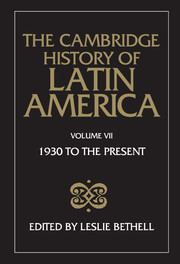11 - The Dominican Republic since 1930
from PART THREE - THE CARIBBEAN
Published online by Cambridge University Press: 28 March 2008
Summary
THE TRUJILLO ERA, 1930-61
On 23 February 1930, the government of President Horacio Vásquez in the Dominican Republic was overthrown by a coup d'état led by the commander-in-chief of the army, General Rafael Leónidas Trujillo. Unlike other military uprisings headed by caudillos during the nineteenth century and the early part of the twentieth century, this coup marked a definitive rupture with the traditional political order. The Dominican people were forced to submit to a totalitarian dictatorship that lasted for thirty-one years, during which the personal interests of the dictator were fused with those of the Dominican state itself. Never before in the history of Latin America had a single ruler been able to impose such a comprehensive control over the minds and properties of his people.
A nation which had endured more than a hundred ‘revolutions’, uprisings and coups d'état during the seventy years between its definitive separation from Haiti in 1844 to its occupation by the United States in 1916 was subjugated to a long-lasting tyranny capable of surviving the economic crisis of the 1930s as well as the upsurge of democratic sentiment following the Second World War and brought to an end only by the assassination of the tyrant in 1961.
The key to understanding the longevity and stability of Trujillo's thirty-year regime lies in the general disarmament imposed by the U.S. Marines, who governed the country from May 1916 until July 1924. This disarmament destroyed forever the power and influence of the traditional guerrilla leaders and made possible the establishment of a professional national police force obedient only to the central government.
- Type
- Chapter
- Information
- The Cambridge History of Latin America , pp. 509 - 544Publisher: Cambridge University PressPrint publication year: 1990
- 3
- Cited by



